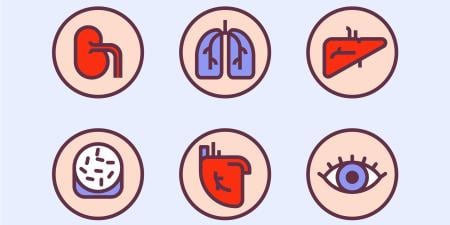Case
The sound of Sam's pager suddenly awakens him. A third-year medical student, Sam is in the midst of his trauma surgery rotation. He rushes to the trauma department and learns that his next patient, Justin Lewis, is a 20-year-old male who was in a major automobile accident. Tested en route to the hospital, Justin had a Glasgowcoma scale score of 3. As Justin is brought to the trauma room, the paramedics tell the attending physician, Dr. Hardy, what they know about the accident. According to the EMTs, Justin fell out of a car that was traveling 70 miles per hour and landed on this head. After an extensive emergency room workup, Justin is declared brain dead. Prior to disconnecting him from the ventilator, the ER staff discovers that he has an organ donor card in his wallet. Familiar with the organ donation procedures, Sam calls the organ procurement agency while Dr. Hardy tells Justin's family the news.
An hour later, Mr. Sterling, a representative from the organ procurement organization arrives at the hospital and introduces himself to the family. Justin's father tells Mr. Sterling that his son definitely wanted to donate his organs, but Justin's mother interjects. She is adamantly opposed to anyone's taking organs out of her son.
Meanwhile, Sam asks Dr. Hardy what the plan for the patient is. Dr. Hardy says that Justin will remain on mechanical ventilation until a final decision is made regarding donation of his organs.
Commentary 1
When the death of a patient is imminent or has occurred, as in the case of Justin, all hospitals that receive Medicare and Medicaid dollars are required by the Conditions of Participation published by the Centers for Medicare and Medicaid Services to have protocols in place for notifying the local federally designated organ procurement organization (OPO). This notification is mandatory whether the patient has a signed organ donor card or not. In Justin's case, even if the ER staff had not found an organ donor card in his wallet, Sam would have been correct in calling the OPO. The OPO determines the medical suitability of the potential donor and usually sends a trained organ donation coordinator to the hospital to review the patient's records, speak to the family, clarify health-related information, and request permission for organ donation. Some OPOs have specially trained family counselors who request permission for donation from the family. If the family gives permission, the donation coordinator assumes the medical management of the donor, and all medical costs from the time of declared brain death are billed to the OPO, not to the patient's insurance or family.
The refusal of families to grant permission is a major impediment to organ donation. Several factors have been shown to improve family consent rates. First, the request for organ donation should be separate—or "decoupled"—from the declaration of brain death. This allows the family time to understand and accept the concept of brain death. In this case, Justin's mother may simply need more time to adjust and accept the death of her son. Second, the request for organs should be made by a trained OPO representative along with the hospital staff as a team. It is best that the physician or nurse caring for the patient not discuss organ donation with the family prior to OPO involvement. The hospital staff and OPO donation coordinator can work together to determine the best time to talk to the family. Third, the request should be made in a private and quiet setting. Higher consent rates have been shown to occur when these 3 procedures arefollowed.1
Even when a patient has a signed organ donation card, the OPO oftenseeks family permission to proceed with donation. The Uniform Anatomical Gift Act (1968, revised 1987) established that a signed organ donation card is sufficient to proceed with donation, and it has been confirmed recently that such documents function legally as advance directives. In the UnitedStates, however, it is customary for the OPO to request permission from the next-of-kin due to fear of litigation.
Recently, several states have passed legislation establishing "first-person consent" whereby the family cannot override an individual's documented desire to be an organ donor. Some states have established first-person consent registries for people interested in being deceased organ donors. This is based on the strong belief that the donor's wishes should be adhered to. It is not dissimilar to a last will and testament that disposes of our personal property and assets after we die. Each year more states are passing first-person consent laws that are strongly supported by the OPOs and the transplant community.
Had Justin died in a state with first-person consent laws, the OPO would have informed the family of his pre-existing declaration to be an organ donor and would not have sought the family's permission. First-person consent removes a burden from family members because they do not have to come to a decision while attempting to cope with the very stressful situation of the death of a relative. First-person consent also avoids the problem of family members' disagreement, and it may benefit families later on: more than one-third of families whomade a decision themselves and declined to donate the organs subsequently regretted their decision.2
In a case such as this one, where the mother and father disagree about organ donation, the donation coordinator would ask the mother why she was opposed to donation and would try to address her specific concerns. The coordinator would emphasize that her son had expressed a desire to donate and that his gift could save and improve the lives of several seriously ill patients. The coordinator would also try to dispel any myths about organ donation that Justin's mother might have heard. It is important for her to understand that her son's body will not be disfigured and that donation will not affect funeral arrangements or viewing of the body. Often times a hospital social worker or pastoral care representative can be called to counsel the family and resolve their disagreement. One of these individuals might have been able to help Justin's mother agree to donation.
Because of the continued shortage of organs for transplantation, it has been argued that we should go beyond first-person consent and adopt the principle of "presumed consent." Presumed consent has been legislated by many European countries with a resulting increase in organ donation rates.3 Presumed consent is an "opt-out" policy in which everyone is considered an organ donor unless he or she registers opposition. This process contrasts with our current, "opt-in" system, in which the individual or next-of-kin must give explicit consent for organ donation. Individual choice is not removed in either case, but persons opting out have the additional responsibility of documenting their decisions. A recent analysis showed that the opt-out countries had a much higher organ donation rate than opt-in countries.4 And in an online experiment, responders' decisions about organ donation were dramatically influenced by whether the question was presented as an opt-in or opt-out choice; rates for donation doubled when the default position was opting out and documentation was needed to opt in; that is, to donate.
Once permission has been obtained, the donor is managed medically to maintain optimal organ function.5 All organs are evaluated for their suitability for transplantation, the donor is screened for infectious diseases (eg, hepatitis, HIV), and blood and tissue types are obtained. The donor information is then entered into the national computer database maintained by UNOS (United Network for Organ Sharing) where it is matched with wait-listed patients. The computer produces a list of the potential recipients for each of the organs ranked by priority as determined by national organ allocation policies. At that point, the donor coordinator calls the transplant centers where prospective recipients are listed to ensure a recipient will be available and waiting for the organ. The organs are then removed in the hospital operating room, often by several surgical teams from different transplant centers in a manner that is respectful of the decedent and his or her family. The young patient in this case could potentially donate his heart, both lungs, liver, pancreas, both kidneys, and small intestine for transplantation,thereby benefiting as many as 8 recipients. He could help many more patients by being a tissue donor (corneas, skin, bone, blood vessels) as well. Many times families report great satisfaction after organ and tissue donation from knowing that so much good can result from so much pain.
References
- Gortmaker SL, Beasley CL, Sheehy E, et al. Improving the request process to increase family consent for organ donation. J Transpl Coord. 1998;8(4):210-217.
- DeJong W, Franz HG, Wolfe SM, et al. Requesting organ donation: an interview study of donor and nondonor families. Am J Crit Care. 1998;7(1):13-23.
- Gundle K. Presumed consent: an international comparison and possibilities for change in the United States. Camb Q Healthc Ethics. 2005;14(1):113-118.
- Johnson EJ, Goldstein DG. Defaults and donation decisions. Transplantation. 2004;78(12):1713-1716.
- Wood KE, Becker BN, McCartney JG, D'Alessandro AM, Coursin DB. Care of the potential organ donor. N Engl J Med. 2004;351(26):2730-2739.



